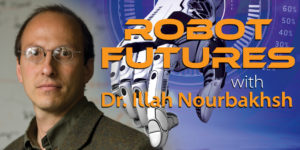 In the future, robots may have superhuman abilities in both the physical and digital realms; and they may even have minds of their own, thanks to artificial intelligence. This is according to Dr. Illah Nourbakhsh, professor of robotics at Carnegie Mellon University. In a talk titled Robot Futures, he will share with a West Virginia audience how society could change as the field of robotics evolves.
In the future, robots may have superhuman abilities in both the physical and digital realms; and they may even have minds of their own, thanks to artificial intelligence. This is according to Dr. Illah Nourbakhsh, professor of robotics at Carnegie Mellon University. In a talk titled Robot Futures, he will share with a West Virginia audience how society could change as the field of robotics evolves.
Nourbakhsh’s presentation is part of the popular STEM Speaker Series. The event will take place at the West Virginia Culture Center Theater (at the State Capitol Complex) on Thursday, April 13, 2017 at 7 p.m. Tickets are free but, due to space constraints, must be obtained in advance via a link at www.wvresearch.org.
Nourbakhsh is also the director of Carnegie Mellon’s Community Robotics, Education and Technology Empowerment (CREATE) lab which explores socially meaningful innovation and deployment of robotic technologies. In his research, he explores human-robot interaction with the aim of creating rich, effective and satisfying interactions between humans and robots. He is the author of several books including Robot Futures and Parenting for Technology Futures.
The Chancellor’s STEM Speaker Series, which most recently featured British Columbia Centre for Disease Control Senior Scientist Dr. Jennifer Gardy, is organized by the Higher Education Policy Commission’s Division of Science and Research with support from a federal grant from the National Science Foundation. The goal of the series is to promote the importance of research and the science, technology, engineering and math (STEM) fields to all West Virginians.
The Division of Science and Research directs the EPSCoR program in West Virginia, while also managing other state and federally-funded academic research programs across the state. The program provides strategic leadership for infrastructure advancement and development of competitive research opportunities in STEM disciplines.